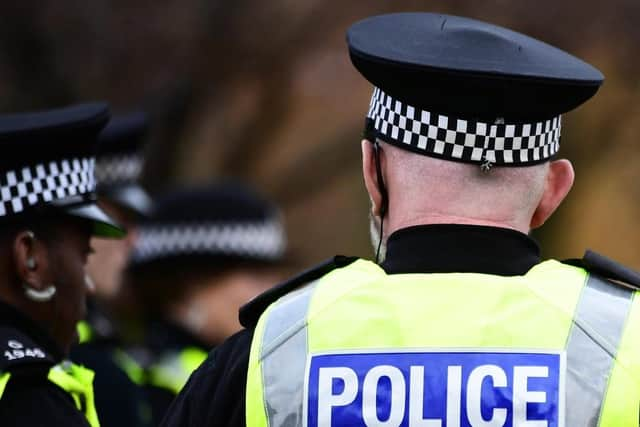Police Scotland must step up vetting, says former chief, amid warning profession is ‘hanging by a thread’ after David Carrick rape case
Police chiefs have said legitimacy in the profession is “hanging by a thread” after rapist David Carrick was exposed – and called for reforms to make it easier to catch other serving offenders.
On Monday, former Metropolitan Police officer Carrick, 48, admitted 49 criminal charges, including 24 counts of rape against 12 women, making him one of the UK’s most prolific known sex offenders.
Advertisement
Hide AdAdvertisement
Hide AdCarrick faced complaints about his behaviour before he joined the force in 2001, then again as a probationer in 2002 and numerous times throughout his policing career until 2021.


He was only suspended from duty in October 2021 when he was arrested for rape. His pay was finally stopped last month when he admitted the majority of the criminal charges he faced.
The former officer, who was sacked from the force on Tuesday, used his position within its ranks at first to win over his victims’ trust and later to intimidate them.
Angela Wilson, ex-assistant chief constable of Tayside, called for an independent body to be set up to look at complaints against officers in Scotland.
Ms Wilson, who is now chair of the Women's Rape and Abuse Centre in Dundee, said the Met had been "very slow to react" and Police Scotland "needs to be getting round the table and doing that scrutiny now".
Speaking to BBC Radio's Good Morning Scotland programme, she said: "They are going to look incredibly neglectful, and indeed stupid, if in the next few weeks a case comes forward in Scotland that they could have picked up on."
Police Scotland said it was "watching developments". A spokesperson said the force would consider further action to "support our drive to maintain the highest standards within Police Scotland".
The head of Scotland’s police force also spoke out on Wednesday following Carrick’s exposure, saying police need to “earn” the trust of the public.
Advertisement
Hide AdAdvertisement
Hide AdChief Constable Sir Iain Livingstone, speaking after he was knighted at the Palace of Holyroodhouse in Edinburgh on Wednesday, said: “[Carrick’s offending is] absolutely outrageous and despicable conduct from an individual who should have never been in the police service.
“Police officers are drawn from the public, the public are the police and the police are the public and nowhere is that truer [than] in Scotland, but we need to earn that trust and that’s something we do every single day.”
The head of the watchdog overseeing Police Scotland said he would be "very surprised" if the force had rogue officers like Carrick among its ranks. Craig Naylor, the Chief Inspector of Constabulary in Scotland, based his assessment on Police Scotland's vetting procedures and professional standards.
He said: "All those who abuse their power as a police officer to commit crime are abhorrent and should be investigated and prosecuted to the limits of the law. This is a difficult task to undertake and many of those who commit crime while serving as a police officer do so in private and maintain a secrecy in their actions."
Police Scotland is not bound by College of Policing guidance, but it said it was "right that policing is held to high standards". Deputy Chief Constable Fiona Taylor said: "Our officers work day in, day out, right across Scotland to protect the vulnerable and keep people safe.
"The onus is on policing to build and maintain the public confidence and consent which is critical to our legitimacy and for our ability to keep our communities and citizens safe. We are resolute in our determination to do so, including addressing sexism, misogyny and violence against women, within our organisation and across society."
Home secretary Suella Braverman said all police forces would be asked to check staff against national databases to identify if anyone “slipped through the net”.
Humberside Police’s Chief Constable, Lee Freeman, called the Carrick case “one of the darkest weeks for policing that I have known” in his career of nearly three decades.
Advertisement
Hide AdAdvertisement
Hide AdChief Constable of British Transport Police (BTP) Lucy D’Orsi expressed her shame and anger that a fellow officer had been free to carry out his 18-year campaign of abuse.
In a blog post on the BTP website, Ms D’Orsi warned gaps in the existing system could allow other serving offenders to “fall through the cracks” and called for a debate on “regulatory reform”.
She wrote: “As it stands today, I could be arrested by the police and nobody but me would know I am the police. In my view, this is a priority issue for our attention. Otherwise, others could fall through the cracks and go on to do harm.”
Ms D’Orsi added: “It’s about time we understood and closed the gaps.”
The chief constable said she was “angry” Carrick used his status to gravely harm women and felt “shameful” that he was free to abuse his victims for so long without alarm bells ringing.
Carrick’s case is the latest in a series of damaging scandals for the Met, including Sarah Everard’s murder, offensive messages exchanged by a team at Charing Cross, and the strip-search of a teenage girl at school while she was menstruating.
Met Commissioner Sir Mark Rowley said weak policies and decisions meant the serial rapist was able to stay in the force for so long, adding the force had “let London down”. More than 1,000 Met officers and staff who have previously been accused of domestic abuse or sexual offences are now having their cases reviewed.